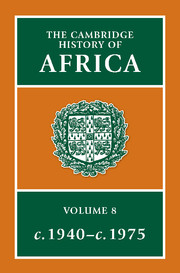Book contents
- Frontmatter
- Introduction
- 1 The Second World War: prelude to decolonisation in Africa
- 2 Decolonisation and the problems of independence
- 3 Pan-Africanism Since 1940
- 4 Social and cultural change
- 5 The economic evolution of developing Africa
- 6 Southern Africa
- 7 English-speaking West Africa
- 8 East and Central Africa
- 9 The Horn of Africa
- 10 Egypt, Libya and the Sudan
- 11 The Maghrib
- 12 French-speaking tropical Africa
- 13 Madagascar
- 14 Zaire, Rwanda and Burundi
- 15 Portuguese-speaking Africa
- Bibliographical essays
- Bibliography
- Index
- References
15 - Portuguese-speaking Africa
Published online by Cambridge University Press: 28 March 2008
- Frontmatter
- Introduction
- 1 The Second World War: prelude to decolonisation in Africa
- 2 Decolonisation and the problems of independence
- 3 Pan-Africanism Since 1940
- 4 Social and cultural change
- 5 The economic evolution of developing Africa
- 6 Southern Africa
- 7 English-speaking West Africa
- 8 East and Central Africa
- 9 The Horn of Africa
- 10 Egypt, Libya and the Sudan
- 11 The Maghrib
- 12 French-speaking tropical Africa
- 13 Madagascar
- 14 Zaire, Rwanda and Burundi
- 15 Portuguese-speaking Africa
- Bibliographical essays
- Bibliography
- Index
- References
Summary
WITH AN APPENDIX ON EQUATORIAL GUINEA
Although modelled with local variations on the ideas and structures of Italian Fascism, and later stiffened by an admiration for German National-Socialism, Portugal's Estado Novo was constrained to neutrality during the Second World War. Geographical realities allowed no decisive preference for the Axis powers before the great turning points of 1942: unlike Franco's Spain, Salazar's Portugal sent no troops to aid the Germans on its eastern front. After those turning points the merest common sense ensured that Portugal's neutrality should be such as to prove acceptable to the western allies.
Portugal's colonies remained intact, but the overall influence of the World War, though less of a nexus of change than it proved elsewhere in colonial Africa, can now be measured as one of various and in some ways profound effect. On the side of the colonised, this influence constituted a formative prelude to the beginning of anti-colonial protest in modern forms; on that of the colonisers, it spurred the system to greater and more insistent exploitation of natural resources and African labour. Generally, the colonial governors anticipated hard times from interruptions to maritime transport. Arguing the economic dangers that lay ahead, the Governor-General of Angola, for example, told his council during its session of 9–14 September 1959 that ‘he wished to see the installation of a war economy’. In fact, so far as most exports were concerned, the hard years were 1941–2, after which there came a recovery and expansion. Sisal exports from Angola fell by half between 1940 and 1941, barely improved in 1942, but more than doubled in 1943 and rose again in 1944.
- Type
- Chapter
- Information
- The Cambridge History of Africa , pp. 755 - 810Publisher: Cambridge University PressPrint publication year: 1984
References
- 1
- Cited by

